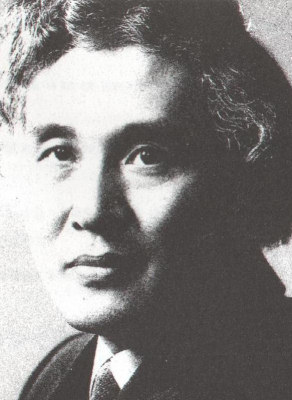Mayuzumi was a student of Tomojiro Ikenouchi at the Tokyo National University of Fine Arts and Music immediately following the Second World War, before going to Europe where he attended the Paris Conservatoire national supérieur de musique.
He was initially enthusiastic about avant-garde Western music, especially that of Varèse, but beginning in 1957 he turned to pan-Asianism for new sonorous material.
A prolific composer for the cinema, he composed more than a hundred film scores between Waga ya wa tanoshi (It's Great to Be Young) in 1951 and Jo no mai in 1984. The best-known film with a score by Mayuzumi is probably The Bible: In the Beginning (1966). He also wrote many pieces for wind band that have been recorded by the Tokyo Kosei Wind Orchestra.
AWARDS
Mayuzumi was the recipient of a Suntory Music Award in 1996.
Works
OPERAS
Kinkakuji (Der Tempelbrand; The Golden Pavilion) (1976, Berlin)
Kojiki (Days of the Gods) (1996, Linz)
BALLET
Bugaku (1962)
Olympics (1965)
The Kabuki (1986)
M (1996)
ORCHESTRAL WORKS
Rumba Rhapsody (1948)
Symphonic Mood (1950)
Bacchanale (1954)
Ektoplasm (1954)
Tonepleromas 55 (1955)
phonology Symphonique (1957)
Nirvana Symphony for male chorus and orchestra (1958)
Mandala Symphony (1960)
Echigojishi (1960)
Music with Sculpture (1961)
Textures for wind orchestra (1962)
Samsara (1962)
Essay in Sonorities (Mozartiana) (1963)
Essay for string orchestra (1963)
Fireworks (1963)
Ongaku no tanjo [Birth of Music] (1964)
Concerto for percussion and wind orchestra (1965)
Concertino for xylophone and orchestra (1965)
Shu [Incantation] (1967)
Tateyama (1974)
ARIA in G for Solo Violin and Orchestra (1978)
Capriccio for Solo Violin and String Orchestra (1988)
Mukyudo [Perpetual Motion] (1989)
ENSEMBLE / INSTRUMENTAL WORKS
Sonata, for violin and piano (1946)
Twelve Preludes, for piano (1946)
Hors d'œuvre, for piano (1947)
Divertimento, for 10 instruments (1948)
String Quartet (1952)
Sextet, for flute, clarinet, bass clarinet, horn, trumpet, and piano (1955)
Pieces, for prepared piano and string quartet (1957)
Mikrokosmos, for clavioline, guitar, musical saw, vibraphone, xylophone, percussion, and piano (1957)
Bunraku, for violoncello solo (1960)
Prelude, for string quartet (1961)
Metamusic, for saxophone, violin, and piano (1961)
Showa ten-pyo raku, for gagaku ensemble (1970)
Rokudan, for harp (1989)
ELECTRONIC MUSIC
X, Y, Z for musique concrète (1953)
Boxing for Radio Drama (1954)
Music for Sine Wave by Proportion of Prime Number (1955)
Music for Modulated Wave by Proportion of Prime Number (1955)
Invention for Square Wave and Saw-tooth Wave (1955)
Variations on Numerical Principle of 7 (1956; with Makoto Moroi)
Aoi no ue (1957)
Campanology for multi-piano (1959)
Olympic Campanology (1964)
Mandala for solo voice and electronic sounds (1969)
FILM SCORES
Waga ya wa tanoshi (1951)
The Woman in the Rumor (??? Uwasa no onna) (1954)
Street of Shame (1956)
Enjo (1958)
Stolen Desire (1958)
When a Woman Ascends the Stairs (1960)
The Warped Ones (1960)
Black Sun (1964)
Tokyo Olympiad (1965)
The Pornographers (1966)
The Bible... in the Beginning (1966)
Reflections in a Golden Eye (1967)
The Profound Desire of the Gods (Kamigami no Fukaki Yokubo) (1968)
Jo no mai (1984)
TOSHIRO MAYUZUMI (1929 - 1997)
TITLES ON KRONOS RECORDS
TOKYO OLYMPIAD 1964
KRONGOLD020

w w w . k r o n o s r e c o r d s . c o m
A R T I S T S

